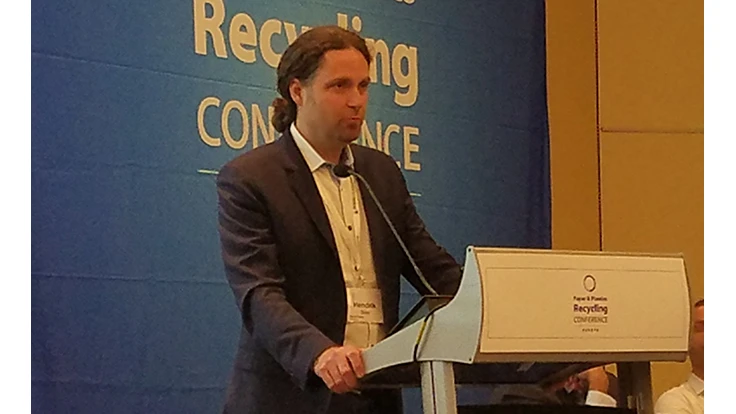
(Pictured: Hendrik Beel of RTT Steinert.)
The European Union has set high landfill diversion target levels for its member states at the same time China is closing the door on mixed scrap shipments. The situation presents challenges for recycling firms and opportunities for sorting technology suppliers, according to presenters at the 2017 Paper & Plastics Recycling Conference Europe event, held in Warsaw, Poland, in early November.
Andreas Walser of Austria-based Hamburger Recycling said brand owners are feeling the pressure to design packaging that is recyclable and to help ensure it is collected for that purpose. He said Hamburger Recycling is positioned to grow along with that trend, with operations in 14 European nations, including Austria, Germany Hungary, Poland and Turkey.
Private recyclers such as Hamburger Recycling, said Walser, “are in a comfortable position; we have no obligations, but a lot of opportunities.” Many of those opportunities, he said, are in Eastern Europe, where there is “real potential for more collection by providing the right collection systems.”
Walser recommended separate collection as the way to meet European and global demands for “more clean fiber,” and he said the government can play a role by helping to subsidize it.
Sébastien Ricard of France-based Paprec Group provided an overview of France’s and the European Union’s increasingly regulated waste sector, which has encouraged recycling in part by limiting landfilling and incineration. He said Germany had been particularly effective in encouraging recycling by making landfilling costs prohibitively expensive.
Ricard said the government’s role is best suited for incentives and goals, and then it should leave it to the private sector and “trust the companies” to meet those goals.
For plastic packaging recycling to meet ambitious EU targets, Hendrik Beel of Germany-based RTT Steinert said increased collection must be matched with upgrading of collected material to high-purity pellets and product manufacturers’ willingness to use those pellets to make new products.
“These three must work together,” stated Beel, adding, “Higher collection rates mean nothing without [accompanying] better product quality.” He predicted that “pushing the MRFs (material recovery facilities) to hjgher throughput rates will come to an end,” and that this genuine attention to quality could “make recycling great again.”
On the technology front, Beel said his company has been deploying HSI (hyperspectral imaging) technology to enable more sorting and recycling of black plastics.
Marcin Lotysz of Bin-E, based in host country Poland, said his firm has developed an office or public space collection bin that can distinguish between paper, plastic and metal items, meaning people can discard items quickly to be recycled.
The device uses an internal camera and mechanically sliding parts to perform the sorting. Lotysz said Bin-E is anticipating introducing its public space bin in 2018 and a home or kitchen device in 2020.
Bill Moore of Atlanta-based Moore & Associates said technology providers have been working on devices to measure moisture and contamination levels in baled scrap paper. The devices are meant to replace what Moore called “ocular technology,” or visual inspection.
He said Brussels-based CEPI (the Confederation of European Paper Industries) has “pushed forward a comprehensive approach for a number of years” to make baled paper quality more transparent.
Subsequently, said Moore, microwave and near infrared (NIR) technology has been developed to help buyers take core samples or scan more deeply into bales to measure moisture and ash content. Such technologies are being used by several major European mill companies, including Spain’s SAICA and Ireland-based Smurfit Kappa Group, and by mill buyers in China, said Moore.
In comments after the technology presentations, a delegate from France-based Veolia expressed reservations about how or whether such measuring devices are being properly calibrated, while a delegate from France-based Suez Environnement wondered why different mills are recording different measurements for bales produced at the same Suez facility.
The 2017 Paper & Plastics Recycling Conference Europe, organized by the Recycling Today Media Group, was Nov. 7-8 at the Hilton Warsaw Hotel & Convention Centre.
Latest from Recycling Today
- BMW Group, Encory launch 'direct recycling’ of batteries
- Loom Carbon, RTI International partner to scale textile recycling technology
- Goodwill Industries of West Michigan, American Glass Mosaics partner to divert glass from landfill
- CARI forms federal advocacy partnership
- Monthly packaging papers shipments down in November
- STEEL Act aims to enhance trade enforcement to prevent dumping of steel in the US
- San Francisco schools introduce compostable lunch trays
- Aduro graduates from Shell GameChanger program





